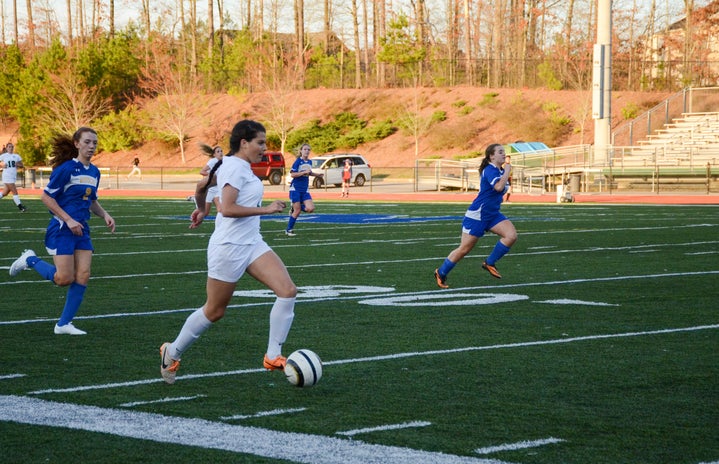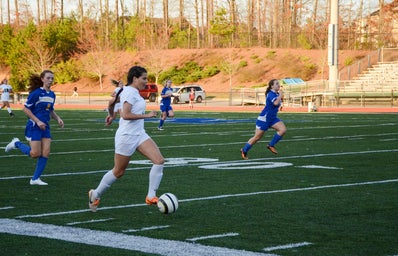Football has always been portrayed to fans around the world as a source of ‘living the dream’. Whether it is down to witnessing your favorite team win the UEFA Champions League or an underdog winning the Euro Cup, it always lends a feeling that lasts for days to come. However, just like every other industry bound in systematic oppression, this one happens to be no exception.
While a young Paul Pogba can dream big, struggle, fight all odds and make it to the starting 11 in a big team, a young girl who exudes the same love for the game cannot do so in the same way. This pans out in two interrelated ways; One being the majority of the fan base that gives leverage to football in the traditionally masculine sense which the gender non-binary fan base also actively contributes to due to the conformity that exists, TV coverage, and the historically infused general understanding of football. While the traditional narrative of football is fun to watch and look forward to, there is always room for more diversity and space for others to fulfill their athletic endeavors.
This happens when the fans’ love is rooted in the game for more discovery, understanding of newer and creative styles, tactics, and so on. This isn’t to undercut or vanquish the male side of it. This comes from a larger understanding on the part of the fan base to give more people the chance to actually think that their talent will be of use because they deserve to be backed by a space that is safe, inclusive, and gives people a fair chance.
Secondly, it is the industries that need to take initiatives with the amount of control they have over these things. An industry that obstructs one of the most popular figures like Lionel Messi’s chances to leave his club leaves no room for doubt as to the scornful treatment meted out to womxn. Even the most popular figures in the female demographic like Abby Wambach and Alex Morgan did not get the recognition they deserve. In 2019, The US womxn’s team won the World Cup but were paid less than the men’s losing team. The justification was based on the lesser credibility of womxn’s teams in general. The industries hold more than enough influence to use their resources and PR strategies to give womxn hope in this realm, to be given the same just treatment.
In football award shows, the categories for male footballers include best starting 11, manager and so on but for womxn, it is just the best female player before male. This concept highlights the vulnerabilities womxn face for not getting enough even if one reaches the top. While over the years the female demographics in terms of an audience has spiked, the metrics of growth cannot be solely down to that.
It is only when they get to actively contribute, and get the pay and respect they deserve will it truly count as progress. Moreover, the representation cannot only be recognized through the audience and players. It includes a plethora of jobs within the industries including talk show hosts, ball keepers, staff, doctors, managers, business associates, commentators, and referees. All these roles have slim to no womxn representation.
Recently, Real Madrid started its women’s team called Real Madrid Femenino. Womxn are constantly active in their league matches but not with the standard hype or popularity that EPL or La Liga players get. They require adequate attention and work in order to not perpetuate gender hierarchy in football. Beyond gender hierarchy, there is a clear distinction between men and womxn in football matches with both being separate due to safety, comfort, and historic and social roots. There is still an important need to address the importance of gender pronouns sensitivity within both the realms and not stick to the standard gender binary.
This goes beyond the tokenistic activism of the Premier League signing up with LGBTQ organization Rainbow laces and taking part in actual ground level work as these little changes go a long way.
Recently, retired womxn footballer Abby Wambach, along with Natalie Portman formed their own LED NWSL team which is the first majority womxn founded team. Natalie is the one who suggested the creation of a team in their own style and the only way to do this was through money. A team is bought by ridiculously rich men in the traditional notion. So, they went ahead with their own resources. While it is a remarkable step and a ferocious way of womxn taking charge, it shows that the ideal way to take up space is through one’s own resources. It is not accessible for everyone and womxn shouldn’t be the only ones having to bear the burden of representation.
The greater change will only take place through narrative shifts, accountability from industries, and the active creation of more spaces for womxn in sports industries by giving them the chance to be the coaches, managers, business advocates, doctors, staff, and players of their own team. In the end, football is the microcosm of the macrocosm that is misogyny that needs to be more inclusive, just as every other industry must strive to be.


